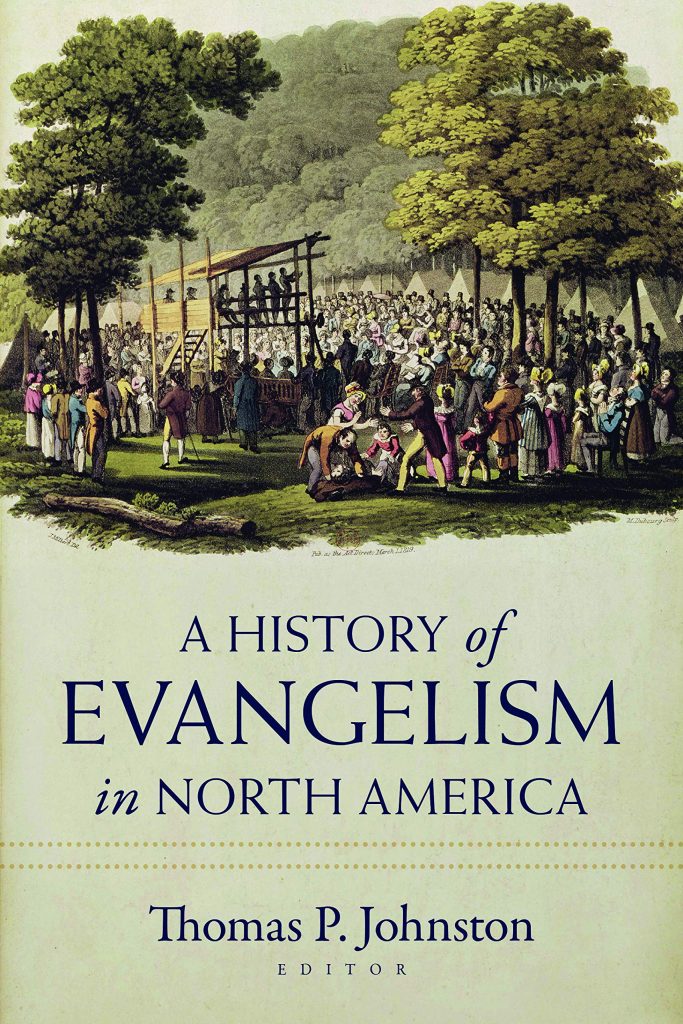
Chapter 13: Dawson Trotman: The Navigators and the Discipleship Movement
Dr. Allan Karr
Written by a number of experts and experienced ministry leaders, A History of Evangelism in North America (edited by Thomas P. Johnson) provides an account of distinct and influential evangelism figures and methodologies from the early 16th century to today. Dr. Allan Karr contributed to this volume by writing on Dawson Trottman and his influence on the discipleship movement through his effective multiplication principle.
In 1955, Trotman spoke to the staff of Back to the Bible. This speech was eventually titled “Born to Reproduce.” In this forty-seven-minute message, he articulated a multiplication process that was a passion of his heart. “[Another] contribution [of Trotman] is rediscovery of the multiplication principle. This, too, Dawson demonstrated in his own ministry, boldly claiming the Great Commission could be fulfilled, the world reached in a generation if the principle were taken seriously.” In this message, Trotman explained the idea, starting with one person leading someone to Jesus and then teaching that person to be ready to teach another, theoretically taking up to six months. After that, he explains the principle in the following way:
(Indent) So this first man at the end of six months has another man. Each man starts teaching another in the following six months. At the end of one year, there are just four of them. . . . So the four of them in the next six months each get a man. That makes eight at the end of a year and a half. They all go out after another, and at the end of two years, there are sixteen men. At the end of three years, there are sixty-four; the sixteen have doubled twice. At the end of five years, there are 1,024. At the end of fifteen and a half years, there are approximately 2,147,500,000. That is the present population of the world of persons over three years of age.
Keep in mind this was 1955; today the population of the world is closing in on 8 billion, children included. But the principle Trotman argued for was that we should make disciples in a way that reproduces. Trotman’s personal ministry was focused on men from his earliest days of working with sailors, but the reproductive principles work just as well when females are involved in evangelism and discipleship. Trotman said in his message, “Men, where is your man? Women, where is your woman? Where is the one whom you led to Christ and who is now going on with him?” Most evangelicals today who have a heart to share the good news of Jesus have heard some version of this principle explained in their training. Later in this message, Trotman said that the principle is undermined by Satan keeping Christians busy with activity other than making disciples. Trotman said, “I believe that is why Satan puts all his efforts into getting the Christians busy, busy, busy, but not producing.”
Dawson Trotman was “an inventive genius combined with an inquiring mind that enabled him to devise methods any Christian could use to study and memorize the Word, to pray, to witness, to grow in Christ.” Trotman’s life epitomized and reflected “the implied value and usefulness of every Christian, for in this ministry [of multiplication discipleship] every layman, talented or not, could participate.
Taken from A History of Evangelism in North America © Copyright 2021 by Thomas P. Johnston. Published by Kregel Publications, Grand Rapids, MI. Used by permission of the publisher. All rights reserved.
Read More

Reflections on the Bible Teaching Conference
Hear from attendees what they learned at the Bible Teaching Conference.

Hope in Suffering
Gateway student Matt Bodden is an evangelist who is ready to answer the question of suffering with the gospel.
Listen
Prophets | Haggai
The boys are back. And by boys we mean the Israelites. The people have returned to their land and after rebuilding their homes and the city walls, God pushed them to finally rebuild His temple. While probably not the most read book in the Bible, Haggai still contains

Prophets | Daniel Part 2
Now with the historical portion of Daniel done, Dr. Wegner takes us through the visions of beasts and years. All these figures intending to show us something. What does it all tell us about God?

Watch

Jonathan Edwards and the Asbury Revival
Chris Chun and Chris Woznicki discuss the signs of true revival, signs of the work of the Holy Spirit, and why it is important to critically assess the characteristics of revival in a spirit of charity.

Jonathan Edwards and the Baptists | Douglas Sweeney, Nathan Finn and Chris Chun
Dr. Douglas Sweeney and Dr. Nathan Finn joined Dr. Chris Chun for a panel discussion on Jonathan Edwards, recorded live at the SBC Annual Meeting in Anaheim.



